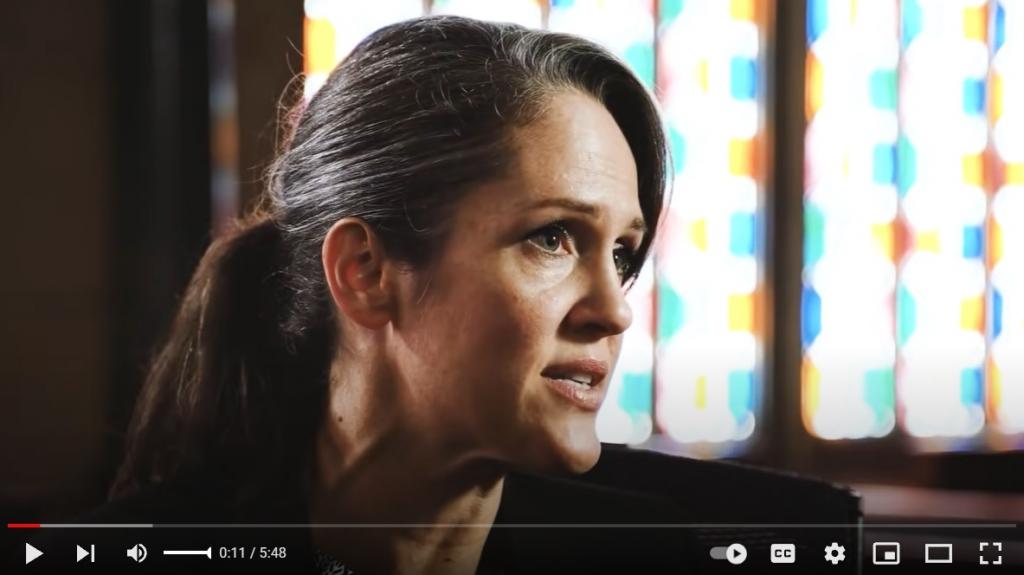If you don’t know who Alisa Childers is, then let me enlighten you. Alisa is a fairly popular YouTuber who has built a decently extensive platform as a conservative Christian apologist. To date, she has over 121K subscribers. And I can see why. The audio/video production is quality. The graphics pop. Alisa is articulate and pretty damn smart. And so are many of her guests.
So, what’s the problem then?
Well, without knowing her personally, I can only speculate; but the first issue I see is that she is wildly inconsistent. The second is that she doesn’t seem all that intellectually honest. For all of her railing against Progressive Christianity, she doesn’t seem interested in representing things fairly. That is to say, after watching a dozen or so of her agenda-driven videos, she seems to only enjoy partaking in the lowest hanging fruit.
Take, for instance, her video entitled “The difference between Progressive and Historic Christianity with/Capturing Christianity.” In it, she sucks you in by getting some initial things kind of correct, before completely going off the rails. For instance, when contrasting Progressive Christianity with “historic Christianity” – already a poisoning of the well – she says that for progressives, it’s not so much about what is believed, but about how two believers can grow together. In her words:
“You can have two Progressive Christians that might disagree on the resurrection – one might affirm it, one might not – and they’re perfectly fine to be in unity with each other because it’s really not about the specifics of what you believe. It’s about growing together and discovering what Christianity is gonna mean now in today’s world.”
On the surface, this all sounds fine and dandy. But there are problems with how Childers presents things. First off, the inconsistency: For all her railing against how intolerant Progressive Christians are, she then seems to contradict herself in admitting that of primary importance is unity. So, which is it? Is it all about unity and tolerance, or are progressives intolerant, like Childers says in so many other places?
Worse yet is that Childers pits “progressive” against “historic” as if the two can’t live in harmony. But she never does this with “conservative” and “historic.” This is the intellectually dishonest part. She would never admit that many Progressive Christians are also theologically aligned with many of the Patristic fathers, from atonement to eschatology to Universal salvation to Christology and beyond. But that doesn’t fit her narrative, so she stands firm in the false dichotomy of “progressive vs. historic.”
Digging deeper, let me ask this: How is disagreeing while remaining in unity not historic Christianity? Sure, historic Christians – for our purposes, let’s say the first, second, and third-century Christians – had their beliefs, their creedal statements, their doctrines, but did they also not disagree greatly?
Yes, they did.
Just compare the Apostles’ Creed and the Nicene Creed. In the video, Alisa says she affirms both, but if you look at them closely, you’ll notice that they are different. Of course, I have no problem with this; I just point it out to suggest that theology did shift in some way; it did progress.
Also, compare the Johannine community with other early Jesus-following communities. They will be different. In fact, in the Johannine community, they had their own internal struggles – in addition to struggles with those outside of it – mainly based on Christological differences. This struggle is no doubt okay; I just point it out to again show that from the get-go, there are major theological differences.
And finally, compare Paul’s Gospel with the Gospel of James, Peter, and the Jerusalem Church. They are starkly different. Just read Galatians and see how pissed off Paul is about the matter. He goes so far as to call it a false gospel delivered by false teachers. Not exactly the theological unity many apologists like to suggest was present from day one.
And yet, for many “historic” Christians – including Paul – one primary goal among others was to continue to be unified for the sake of Christ. That’s why Paul basically says if you want to eat kosher, eat kosher, but just don’t expect Gentiles to do the same. And if you are gonna get circumcised, get circumcised, but just don’t make others do it. In this sense, then, Paul was both “progressive” and “historic.” He was historic because he lived in the first century and was the one initially charged with bringing the Gospel to the Gentiles. He also made it clear that certain beliefs were of utmost importance (see 1 Corinthians 15). But he was also “progressive” in that he believed two people could have different beliefs about something and still be united in Christ. Jew or Gentile didn’t matter. Male or female didn’t matter. Kosher or non-kosher didn’t matter. Circumcised or uncircumcised didn’t matter. Unity mattered.
And speaking of Paul, this is where Childers’ is at her most dishonest. In the aforementioned video, she flippantly says how Progressive Christians “don’t really like Paul very much.” Well, that might be true of some, but again, it’s low-hanging fruit. I, for one, have gone so far as to read books on Paul that I can barely understand. I’ve read Douglas Campbell’s 1,200 page tome The Deliverance of God. It seems half of it is in Koine Greek, but I still muddled through. I’ve also read J. Louis Martyn’s Galatians. Not easy reads. But if I didn’t like Paul, I wouldn’t read them.
A more honest thing to say would be something like, “Progressive Christians don’t think Paul got everything right.” That would be a more fair assessment, but Childers doesn’t really seem interested in fair. She’s an apologist, and her entire platform – 121k subscribers and growing – seems more well-defined by what she is not: a progressive.
Of course, she would never admit this. In fact, in the video I referenced above, her understanding of historic Christianity is basically this: the affirmation of the creed in 1 Corinthians 15. You know, the one about how the Scriptures affirm the resurrection.
No doubt, Childers has every right to affirm this, but many Progressive Christians would also affirm everything in 1 Corinthians 15. In fact, many of us would take that chapter much more literally than any of the fire and brimstone Christians. We would take Paul at his word when he says that all will be made alive in Christ (v. 22) so that God can be all in all. Not some. All. I’m guessing Childers wouldn’t go that far, but because I’m a Progressive, I’m okay with that.
At the end of the day, I guess my main point is that Alisa Childers, for all of her polish and linguistic ability, isn’t really saying anything. She constantly pits Progressive Christianity against “real” Christianity, and in doing so, misses the entire point. Like Sean McDowell, who I commented on in a recent post, her entire schtick seems to be this: “We are the real Christians; Progressives aren’t.” But what they both fail to realize is that many Progressives affirm all the things they say are required to be an “historic” Christian: resurrection, repentance, faith in Christ, respect of the Scriptures, and so on. And yet, they still malign and misrepresent, all while building a pretty large following on multiple social media platforms. Consider me not surprised, nor impressed.
If you wanna get to know me better, please follow me on social media. I’m pretty active on all platforms:
Also, if you’ve been digging my work on here, and want to see me be able to continue writing as close to full-time as humanly possible, please take a look at my Patreon page at www.patreon.com/mjdistefano. Even $1 a month helps bigly!!!















